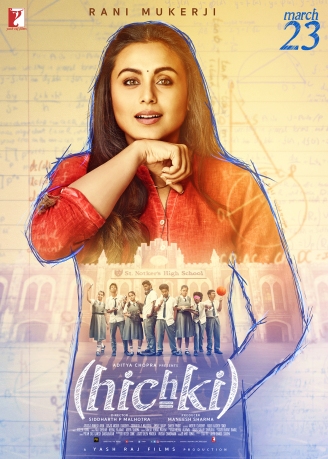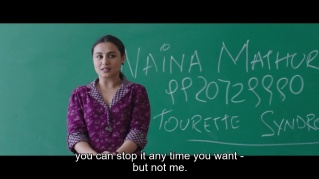
Amar Kaushik’s Stree starts with the intriguing message that the story is based on a ‘ridiculous true phenomenon’, apparently referencing a folk-tale from Karnataka, but which really could be any one of a number of similar stories world-wide. The film is billed as a horror comedy, and manages to be both funny and scary, which is an excellent achievement in a genre that generally manages one or the other, but rarely both. The story takes place in the wonderfully atmospheric town of Chanderi, making Stree worth watching just for the architecture alone, but in addition, Rajkummar Rao is excellent, Pankaj Tripathi and the rest of the support cast are brilliant, and the blend of social commentary, dark humour and ghostly appearances makes for an unusual but entertaining film.
The basic premise of the story is the annual haunting of Chanderi by a female ghost that preys on the men of the town. For the first four nights of Navratri, Stree calls to any men she sees alone at night stealing them away and leaving behind nothing but their clothes. The best part about this is that she calls their name three times, and if they turn around, she takes that as consent. Naturally then, all the men have to do to be safe is not turn around – but somehow they seem unable to manage this. I love the idea of a female ghost that looks for consent, particularly in Hindi cinema where the men don’t usually give women the same consideration, which is of course the whole point. But also, and more subtly, there is the message that the men are so desperate for love that they can be easily seduced by the ghost despite knowing the consequences.
Protection from Stree can also be gained by writing a message outside the house asking Stree to come back the following night. Surprisingly the literate Stree obeys, keeping the menfolk safe from her clutches as she continues to follow the directive and return the next night until her time is up. The presence of Stree means that the tables are turned and in this story it’s the men who are terrified and unable to go out alone at night. Some even resort to dressing as women to be able to venture outdoors at night safely, while the rest huddle behind their womenfolk in fear. The film has a lot of these ‘role reversals’ that shine the spotlight on the treatment of women in India. There is even an item song with Nora Fatehi gyrating away in front of a crowd of young men, but at the end she is politely escorted away by bodyguards, totally in control of the situation, while one of the men ends up as Stree’s first victim.
Against the backdrop of the ghost, the film follows Vicky (Rajkummar Rao), a ladies tailor who can gauge his clienteles’ measurements with just a glance, and his romance with an mysterious woman. Despite his obvious talent, Vicky feels that he is destined for bigger and better things, but while he’s waiting for them to happen, he spends his time in Chanderi stitching clothes and hanging out with his friends Bittu (Aparshakti Khurana) and Jana (Abhishek Banerjee). At the start of Navratri, Vicky meets an enigmatic female visitor (Shraddha Kapoor) who has come to the town for the festival, and who commissions Vicky to make an outfit for her. Although his friends are sceptical and even suspect the newcomer may be Stree, Vicky is instantly smitten and ends up on a couple of dubious ‘dates’ with the mysterious stranger. At the same time, Stree has started her annual haunting, although Vicky denies her existence until Jana is one of the men taken by the vengeful spectre. Suddenly Vicky has a reason to find out more about the ghost, and he enlists the aid of local bookstore owner Rudra (Pankaj Tripathi) and even his mysterious girlfriend to track down Stree and rescue the men she has taken.
Part of what makes the film work so well is the humorous dialogue between the three friends and the mix of jokes, physical comedy and deliberate misdirection. When interspersed with some hair-raising moments as Stree creeps up behind yet another victim, the relief gained makes everything seem even funnier and also serves to exaggerate the horror element even more. The first half in particular is well written to blend story development with comedy and horror, and although the repeated attempts to lay the ghost start to drag a little in the second half, there is still enough that is unexpected to give a few shocks right up to the very end. Rajkummar Rao is in his element and he is brilliantly funny as a small-town tailor who is mostly oblivious to the world around him. His reaction to discovering a pretty girl seems interested in him is entertaining and his slave-like devotion to her every wish is cleverly milked for every last drop of humour. Aparshakti Khurana is also excellent as Vicky’s cynical and more sceptical friend, while Abhishek Banerjee is hilarious as the more gullible and susceptible of the trio. I love the contrast between their friendly banter and the more serious discussions going on around them as Stree makes her reappearance into the town while they seem totally oblivious of the danger.
When it comes to the more spooky elements of the story, Shraddha Kapoor does a good job of shrouding her character in mystery without overdoing the ‘silent stranger’ vibe. Although she doesn’t have too much to do other than appear mysterious, her character does keep you guessing, particularly since writers Raj Nidimoru and Krishna D.K. throw in some lovely red herrings (or are they?) along the way. I really enjoyed their previous film Shor in the City, which had a blend of action, violence and comedy, but Stree is a gentler watch that adds more social commentary into the mix. Part of the novelty of the film comes from the tweaking of stereotypical gender roles and the subtle but definite insistence on women’s rights (including the right of a prostitute to insist on the use of a condom) throughout the screenplay. Although much of the film is very dark, Amalendu Chaudhary makes excellent use of the old buildings as a backdrop, while maintaining a suspenseful atmosphere even during the daylight scenes. Director Amar Kaushil does a good job of keeping everything together with only the odd misstep towards the end of the film.
It’s not a perfect movie, but it’s a good entertainer and the digs at patriarchal society add an extra dimension to the story. Worth watching for clever dialogue, plenty of laughs, a few good scares and excellent performances from the cast. 4 stars.

































































